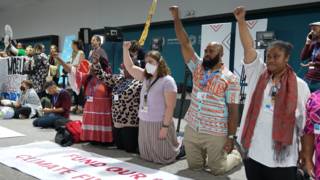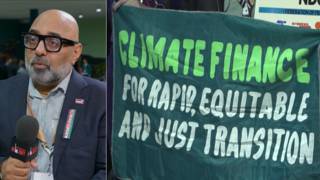
Related
The European Union’s foreign policy chief has accused Israel of using starvation as a weapon of war by blocking aid from entering Gaza. The World Food Programme managed to deliver aid to Gaza City for the first time Tuesday in three weeks, but the agency said famine is imminent in northern Gaza unless aid deliveries increase exponentially. Meanwhile, as the United States proposes building a seaport off Gaza and airdrops for food aid, Palestinian American journalist Rami Khouri calls the proposals “sheer entertainment” that is “designed primarily to make Americans feel better about themselves.”
Transcript
AMY GOODMAN: So, Rami, let’s talk about Gaza. The European Union’s foreign policy chief has accused Israel of using starvation as a weapon of war by blocking aid from entering Gaza. The World Food Programme managed to deliver aid to Gaza City for the first time Tuesday in three weeks, but the agency said famine is imminent in northern Gaza unless aid deliveries increase exponentially. Meanwhile, the U.S. says it’s begun shipping parts to build a temporary port off the coast of Gaza to increase aid, while still shipping bombs to Israel to attack Gaza. Rami Khouri, if you can comment on this and now Morocco saying it’s worked out a deal with Israel? It’s going to fly something like 40 tons of aid into Tel Aviv and then has secured a way to transport that aid over land, through an Israeli crossing, into Gaza.
RAMI KHOURI: You know, there’s all kinds of ideas being discussed about how do you reduce the suffering of the Palestinians in Gaza because of the Israeli genocidal attack, which is directly supported and armed and funded by the United States. One of these ideas is to bring aid into Israel and ship it overland. Another one is to come up from Egypt through the Sinai. A third one is to have direct flights or ships coming into Gaza. But all of these are patchwork Band-Aids that don’t really solve anything in the long run, because all you need is one attack by any group — and, you know, the Israelis or Hamas or some freelance thugs, anybody, could fire a rocket at one of these aid shipments, and the whole thing would come to a halt. So, these are not serious responses.
You know, the Americans came up with the airdrop idea, and then they came up with the floating pontoon dock, about the same time as the Oscars took place in Hollywood. This is entertainment. This is not serious diplomacy or strategic stabilization of the Middle East. This is sheer entertainment designed primarily to make Americans feel better about themselves because they’re aware that they are involved deeply in the genocidal assault by Israel on Gaza. And they are aimed primarily to help the Democratic Party in the next presidential elections coming up in November, because the Democrats are facing serious pushback from a big coalition of Arab Americans, Muslim Americans, Black Americans, Hispanics, progressive Jews, labor unions, all kinds of people who form the core heart of the Democratic Party traditionally, and they’re basically now thumbing their noses at Biden and saying, “Look, we don’t play this game anymore where you just make promises and then continue your genocidal policies.”
And the significance of this is it’s not just Arab Americans. And the media, as typically happens, with a few exceptions, like you and a few others — that media in the U.S. and most of Europe, and England, in particular, they just talk about, “Oh, the Arab Americans are complaining, or Muslims Americans.” It’s much wider than that. Americans are fundamentally decent people. They don’t like to see their money and their guns and their government supporting what has now been called a plausible genocide by the highest court of the world. And this is serious stuff. And the American citizens don’t feel comfortable being associated with this kind of criminality. But for the government to respond with theatrics and cartoonlike efforts to show how effective their technology is and what amazing things we can do, this is not serious. The Americans really haven’t really thought out all the implications of this shipping by air or by pontoon bridges or boats or whatever, the distribution of the food.
UNRWA is the most efficient food distributor in Gaza, and the United States is trying to destroy UNRWA because Israel asked it to. And Israel asks the United States, pushes the red button, when it needs American criminal assistance, and the Americans tend to respond, most of the time. And the Americans defunding UNRWA is a criminal activity, because it has massive implications for the well-being and even survival of Palestinians in Gaza and many other refugee camps around the region.
So, if the U.S. is serious about helping reduce civilian suffering in Gaza, it has very, very simple, quick ways to do it, which is to lay down the law with the Israelis and say, “Look, you’re not going to get — we’re not going to remain complicit in this genocide of yours. You have to stop obstructing the delivery of food and medicine and other things into Gaza, or else we’re going to stop the delivery of arms and funds and diplomatic protection at the U.N.” This is a tough position for the U.S. to take. It has taken similar positions a few times in the past. But you have to have resolve, you have to have serious analysis in the White House, and you have to have a wellspring of decency and ethical behavior — all three of which are now missing from the White House policy on foreign policy in the Middle East.
JUAN GONZÁLEZ: But, Rami Khouri, this bizarre plan for a temporary pier, given the fact that it would take as much as two months to prepare, isn’t that effectively the United States recognizing that this war, this genocidal war, is going to go on much longer than most, I guess, of the American public expected?
RAMI KHOURI: Absolutely. This is exactly the point I’m trying to make, that the United States and Great Britain, most of all, among the Western countries, are explicitly, openly, even enthusiastically supporting the plausible genocide that Israel is carrying out. And this is one of the great mysteries of modern times. Why would two countries like the U.S. and the U.K., which boast about their commitment to democracy and human rights and equality and all of these good things — why would they be so emphatic and so consistent in supporting this? They don’t have a problem with 30,000 Palestinians killed and hundreds of thousands injured or displaced. They clearly don’t have a problem with it. Their words mean nothing. Their actions speak volumes about what they truly feel in their hearts. This is the government. The people of these countries are much better than that.
But the U.S. and U.K. and a few other countries are all-out supporting Israel in doing this, and they have been since 1917, when England issued the Balfour Declaration. That’s why we say you’ve got to look at the historical context. In 1917, the United Kingdom issued the Balfour Declaration to the small, young Zionist movement in Europe, saying, “We support the creation of a Jewish homeland in Palestine.” And Palestine was 95% Arab. There was a small Jewish community that had always existed there, and should always exist there, but it was 95% Arab. It’s like me saying there should be a Palestinian homeland in the center of Manhattan. It just is not — it’s not right. It’s not possible. You can’t take somebody else’s land and create your own country.
And since 1917, the Zionist movement and the state of Israel, supported by the U.S. and U.K. and others, has enthusiastically pursued the plan to diminish the number of Palestinians living in Palestine so you can have an exclusively Jewish state, which is the government policy now of this government in Israel. But it has failed. It has failed because the number of Palestinians between the historic Palestine, from the Jordan River to the Mediterranean Sea, which includes Israel and some of the Occupied Territories, there are more Palestinians now than Israelis, more Christian and Muslim Palestinians than Jewish Israelis. So, not only is the Israeli plan vicious and cruel and criminal, it’s also ineffective.
And the United States is pursuing its amateurish, comic, entertainment-based, cartoonlike foreign policy to support this, knowing that it’s going to fail. And, you know, the airdrops were the best example of this, those five poor kids who were killed by these food packets that fell on them and killed them. This is unbelievable that the United States would carry out these kinds of policies. The pontoon bridge is another one.
There are so many ramifications of that also that haven’t been discussed or explored, in terms of what’s it going to mean in terms of recreating Israeli direct security control mechanisms in Gaza to protect the food and allow it to be distributed. Who’s going to distribute it? Is this going to create new mechanisms, which already are starting to take shape now, of lawless, ganglike behavior among starving, desperate Palestinians? And this is human nature. Anybody who’s starving and desperate is going to create gangs and to go get the food and distribute it. And this is exactly what’s happening. This is exactly what the Israelis want. They want the Palestinians to act in this manner, and therefore, the Israelis can show the world, “Look at these — these are animals, these Palestinians.” And they want to drive them out. And there’s another fear also that if UNRWA is not allowed to continue its activities, the distribution process will end up being either politicized or criminalized. And this is with the direct involvement of the Israelis and the Americans and some Arab countries. And this is also not a very good idea.
AMY GOODMAN: Rami Khouri —
RAMI KHOURI: So, there’s many —
AMY GOODMAN: — we want to thank you so much for being with us, Palestinian American journalist, senior public policy fellow at the American University of Beirut, joining us today from New York.
When we come back, we speak with civil rights advocate and author Michelle Alexander, who says, “Only Revolutionary Love Can Save Us Now.” Back in 20 seconds.
[break]
AMY GOODMAN: “Everything Must Change,” sung by Nina Simone. The song includes the words “The young becomes old / And mysteries do unfold / For that’s the way of time / No one and nothing stays unchanged.” These are words quoted by our next guest.











Media Options